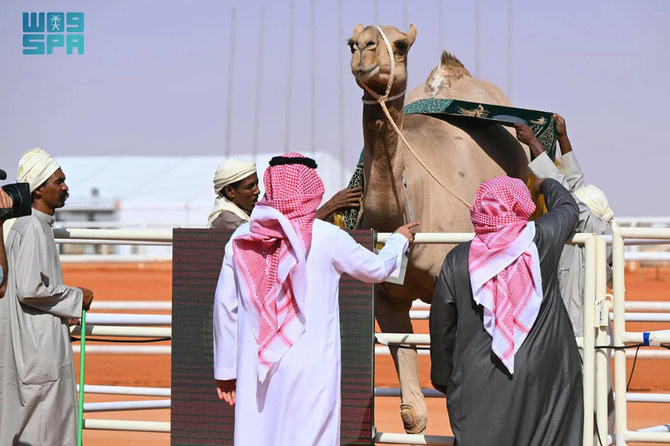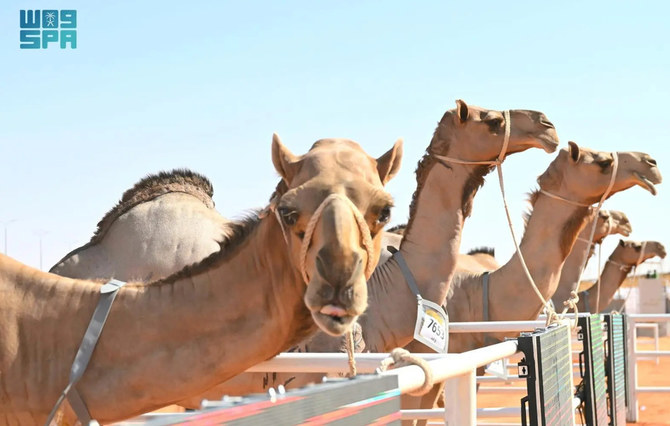RIYADH: The eighth King Abdulaziz Camel Festival, organized by the Saudi Camel Club, kicked off today, taking “Glory to its People” as its slogan.
The 45-day festival is held in Al-Sayahid, 120 km northeast of Riyadh.
The festival brought back life to the Dahna desert, once an area connecting trade routes from the east to the west of the Arabian Peninsula. It has now become a revived tourist destination, with accommodation and shops scattered all over.
The site was chosen for its historical depth and national significance. As well as hosting merchants and pilgrims, it was once a gathering point for the armies of the founding King Abdulaziz Al-Saud in the process of unifying the country.
The festival aims to boost the camel’s heritage in Saudi, Arab and Islamic culture, provide an integrated economic system in terms of auctions, supplies and industries related to camels, and develop the traditions of the community.
The management of the festival set up the Saudi Camel Village in Mazayen Al-Ibl, to hold activities and events related to camels and their culture. They aim to make it the first and most important site in the world for camels.
The first section of the village includes Al-Mazayen Square, which is 264,000 square meters and includes 85 barns, the main area, which accommodates 450 people, and the VIP stands, accommodating 312 people.
The section also includes 5,760 square meters for visitor stands, which can hold up to 6,000 chairs, and over 1 million square meters for the auction area, which includes 145 barns, a sorting area, registration offices, locations for suppliers and brokers, and a 5 km camel track linking the inspection and sorting areas to Al-Mazayen Square.
The second section is for accommodation, with a total area estimated at 1.1 million square meters, divided into three categories. The third section is Al-Dahna Market located to the east of the festival, 6 km away from its center, and 2 km long.
The village center and the desert park are located in the fourth section. They hold areas for recreational and cultural activities and events, and an area for selling folk products, foods, and crafts.
The festival also holds cultural and traditional activities for all ages. This year’s festival includes more than 20 activities across 18 locations in Al-Sayahid area, featuring competitions, exhibitions, and performances suitable for all age groups.
It also features more than 320 competitive rounds, including camel beauty pageant competitions (Mazayna), purebred camels, camel racing without jockeys (Hajjij), and traditional racing.
Punters can ride camels and experience getting to know, milk, feed, nurture and cuddle the animals, in addition to taking souvenir pictures with them.
The festival also includes Al-Oqailat Museum, the dialogue poetry event, the falcon area, and the folk market, which includes antique and traditional collectibles and goods, such as crafts, camping tools, camel supplies, traditional seats, spices, supplies for coffee producing families, and traditional food.
The 8th King Abdulaziz Camel Festival set to bring ‘glory’ to Al-Sayahid
https://arab.news/wamgd
The 8th King Abdulaziz Camel Festival set to bring ‘glory’ to Al-Sayahid

- The festival brought back life to the Dahna desert
- The site was chosen for its historical depth and national significance
More than 150 caves reveal their secrets in Saudi Arabia

- More than 150 caves have been recognized for their significant scientific value
- Caves have a growing role in the development of sustainable ecotourism
RIYADH: They may look dark and forbidding, but caves across various regions of Saudi Arabia are shedding new light on some of Earth’s oldest secrets.
According to the Saudi Geological Survey, caves and geological features in the Kingdom are unique natural treasures providing a vital foundation for scientific research.
More than 150 caves have been recognized for their significant scientific value, with some serving as natural records of the planet’s geological and climatic history, the Saudi Press Agency reported.
Caves also have a growing role in the development of sustainable ecotourism, the Saudi Geological Survey said.
The organization is working to uncover and study these sites as part of the national strategy, the SPA added.
Studies offer precise scientific evidence of environmental changes the region has undergone over thousands of years, including rare plant and animal remains from species that become extinct due to natural shifts.
Tariq Aba Al-Khail, spokesperson for the Saudi Geological Survey, said that the organization enables researchers and specialists in geosciences, archaeology, and paleobiology to study these caves within a structured scientific framework.
He highlighted the organization’s role as a reference for accurate geological data and its commitment to building partnerships with academic and research institutions to strengthen the knowledge base and raise community awareness about the value of these natural resources.
Farasan Islands celebrate annual harid fish arrival

RIYADH: The shores of the Farasan Islands are witnessing the annual arrival of large schools of harid fish, which travel for months from the Indian Ocean, through the Arabian Sea, and into the Red Sea.
The harid fish, or parrotfish, is a diverse species inhabiting coral reefs and plays a key role in the marine ecosystem.
Recognizable by its parrot-like beak and vibrant colors, the harid thrives in coral-rich habitats, with over 90 species, each having unique shapes and colors.
Farasan, a group of coral islands 40 km off Jazan’s coast, becomes the site of this natural event as vast schools of harid fish gather, according to the Saudi Press Agency.
Residents can predict the fish’s arrival by a distinct scent carried from the sea after sunset on the 15th day of the lunar month.
The annual harid catch, celebrated in late April, is a tradition reflecting the islands’ cultural heritage and has brought joy to Farasan for centuries.
Recognizing the cultural and tourism significance of harid fishing, Jazan Gov. Prince Mohammed bin Nasser inaugurated the first Farasan Islands Harid Festival in 2005.
The 21st edition of the festival launched on Monday, showcasing the islands as a promising destination for tourists and investors.
The festival highlights Farasan’s unique customs, traditions, folk games, handicrafts, and historical sites, while also showcasing local handicrafts such as fishing traps, palm weaving, bag and rug creation, and hat knitting.
Saudi aid agency helps crisis-hit people worldwide

RIYADH: Saudi Arabia’s aid agency KSrelief continues to deliver vital humanitarian assistance to some of the world’s most vulnerable people.
In Kenya, a KSrelief volunteer medical team performed 28 cochlear implant surgeries for children in a single day, the Saudi Press Agency reported on Monday.
They also provided speech and language rehabilitation for the children and held education sessions for their families.
In the Syrian Arab Republic, KSrelief distributed 650 clothing bags to orphaned children in Al-Bab, Afrin, and Akhtarin in Aleppo governorate.
The bags included new clothes suitable for children of various ages, to meet their needs and bring them joy.
In Jordan, KSrelief concluded its 30th volunteer program at the Zaatari refugee camp, involving 12 medical volunteers.
During the week-long campaign, the team provided healthcare to 1,141 beneficiaries, offering treatments in dermatology, gynecology, oncology, pediatrics, family medicine, and physical therapy.
In Yemen, KSrelief distributed 176 shelter bags and 45 tents in Al-Shihr district, Hadramout governorate, benefiting 1,056 individuals.
In Sudan, KSrelief distributed 1,660 food baskets to displaced and needy families in Ad-Daba, Northern State, benefiting 9,960 individuals.
Since its launch in May 2015, KSrelief has implemented 3,393 projects worth nearly $7.9 billion across 106 countries, in partnership with more than 309 organizations.
Red Crescent invites volunteers for Hajj season

JEDDAH: The Saudi Red Crescent Authority has opened volunteer registrations for this year’s Hajj season, continuing its mission to promote volunteerism and encourage community participation in humanitarian services.
As part of the initiative, volunteers are invited to join one of four main tracks, the Saudi Press Agency reported on Monday.
The paramedic track focuses on delivering emergency first aid and rescue services before specialized teams arrive.
The humanitarian track involves offering care and assistance to pilgrims, including distributing snacks, water and guidance.
Those with creative skills can join the media track, which documents volunteer efforts through photography, videography and editing.
Meanwhile, the logistics track supports operations by handling the distribution, transportation, and storage of essential materials and equipment.
The authority encouraged people to register through its volunteer platform, describing volunteering with the Red Crescent as a meaningful opportunity to gain valuable skills, contribute to life-saving efforts and support the wider community.
Healthier and greener nation is focus of Environment Week 2025

- Aim to raise public awareness among school children
- ‘Our Environment is a Treasure,’ is the theme this year
RIYADH: The organizers of Saudi Arabia’s Environment Week are aiming to increase public engagement to secure a thriving and greener future for the country.
The event began on Sunday and was attended by Environment, Water and Agriculture Minister Abdulrahman Al-Fadley, and Minister of State for Foreign Affairs Adel Al-Jubeir.
Reema Obaid, one of the participants, told Arab News: “We are here at the environmental awareness initiative, which is raising awareness about our environment for a healthier and greener environment.”
Obaid explained that children can gather at her booth to plant seeds or cuttings. Then they can either take their plants with them or donate them to national parks in the Kingdom.
Another activity is “Green Leader,” under the nation’s Environment Fund. It is a green bus symbolizing the country’s sustainability journey from the past to the present.
Weed Al-Balawi, a participant in the initiative, said they designed it to “deliver major concepts regarding sustainability, resource conservation, ancestral heritage, and technology in environmental conservation.”
The aim was to ensure a “simple and enjoyable way to benefit the target group, which is the age group from primary to intermediate school,” said Al-Balawi.
She said the education stations at the event were created for the public to experience how people used sustainable practices in the past on a daily basis to coexist with nature and biodiversity.
The final station at the event showed current practices, which includes how people are now using technology to protect the environment, said Al-Balawi.
One of the examples displayed was the camel’s watering place, where people would dig a small well for the animals next to the one they used for drinking.
This ancient technique was used to prevent diseases spreading from animals to humans, and to reduce the amount of wasted water.
The theme of this year’s event is “Our Environment is a Treasure” and will be held until April 26.
A highlight was the debut of the National Environmental Performance Index, a strategic tool to monitor progress and guide policy.
There were 13 agreements signed between the ministry’s entities and the private sector to improve collaboration in environmental projects.























